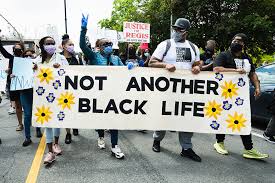While advocates can point to some specific actions being undertaken or at least seriously discussed on police reform,the larger question of whether calls for deeper understanding of the impact that colonialism and slavery have had on modern day society will translate to concrete action remains open. Likewise, it's too soon to tell whether policy changes that address system racism in healthcare, education, housing and employment will result from the movement.
雖然倡導者可以指出正在采取的一些具體行動,或至少認真討論警察改革問題,但更大的問題是,要求更深入地了解殖民主義和奴隸制對現代社會的影響是否會轉化為具體行動,這個問題仍然懸而未決。同樣地,現在還不能斷定,是否會因這場運動而產生一些用于解決醫療、教育、住房和就業方面的制度性種族主義的政策變化。

For Cullors, just seeing the calls for such changes reverberate around the world has "been a really powerful moment for Black folks."While the BLM movement has grown around the world, however, it is not without its detractors—and global momentum could subside if criticism continues and grows in strength. Some commentators, for instance, have derided the movement as a "neo-Marxist" effort bent on dismantling critical institutions like the police and redistributing wealth by calling for reparations for slavery and endemic racism. Others have been critical of the violence and looting that has marred some protests, both in the U.S. and abroad.Since starting the BLM movement, however, Cullors has heard from detractors—and she believes calls for reform will not be deterred by them.
對于卡勒斯來說,看到這種變革的呼聲在全世界回蕩,“對黑人來說是一個非常強有力的時刻”。然而,盡管“黑人的命也是命”運動在全球范圍內發展壯大,但也并非沒有批評者,如果批評繼續下去,力度不斷加大,全球勢頭可能會減弱。例如,一些評論員嘲笑這場運動是一場“新馬克思主義”的努力,它致力于摧毀警察等關鍵機構,并通過呼吁對奴隸制和地方性種族主義進行賠償來重新分配財富。另一些人則批評暴力和搶劫破壞了美國和國外的一些抗議活動。然而,自從“黑人的命也是命”運動開展開始以來,卡勒斯就聽到了批評者的聲音,她相信改革的呼聲不會被他們嚇倒。
Like it or not, she told Newsweek, change is happening: "People on the ground are making the changes now."For the time being at least, this much is true: No matter what language is spoken, there are serious conversations happening now in many countries about police violence toward Black people, the long-term impact of slavery and the economic and public health risks of systemic racism that weren't being talked about as broadly and publicly as they are now—and that feels like noteworthy progress for many in the international Black Lives Matter movement.
不管你喜不喜歡,她告訴《新聞周刊》,變化正在發生:“陸地上的人們正在做出改變。”至少就目前而言,這一點是正確的:無論人們說什么語言,現在許多國家都在嚴肅地談論警察對黑人的暴力行為、奴隸制的長期影響以及系統性種族主義引發的經濟和公共健康風險,這些問題從沒有像現在這樣廣泛和公開地談論過。對于國際“黑人的命也是命”運動的許多人來說,這似乎是值得注意的進展。
"People who were on the periphery of all of these issues are, all of a sudden, here. There are grandmas now talking about prison abolition." Berlin activist Diana Arce told Newsweek. "We've gone from zero to 100. It's exciting."
“那些在所有這些問題的邊緣的人,突然之間,關注這些問題。現在有一些奶奶們在談論廢除監獄。”柏林維權人士戴安娜·阿爾塞對《新聞周刊》“我們實現了從0變成100。太令人興奮了。”
譯文由可可原創,僅供學習交流使用,未經許可請勿轉載。












